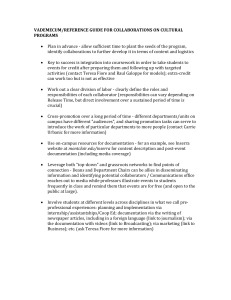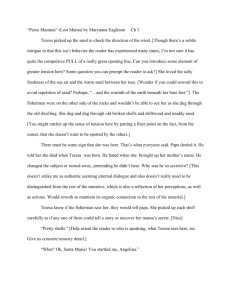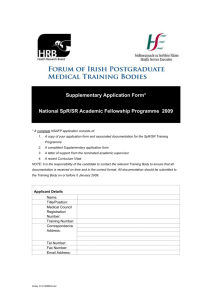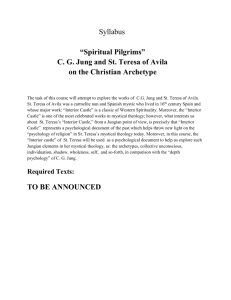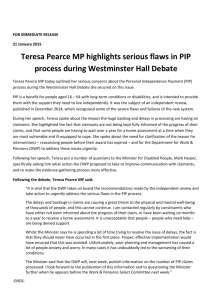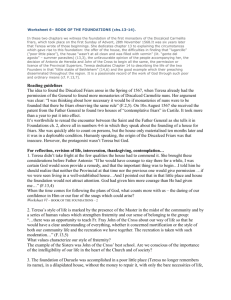FAMILY TREE By Andrea Jeftanovic Translated by Janet
advertisement
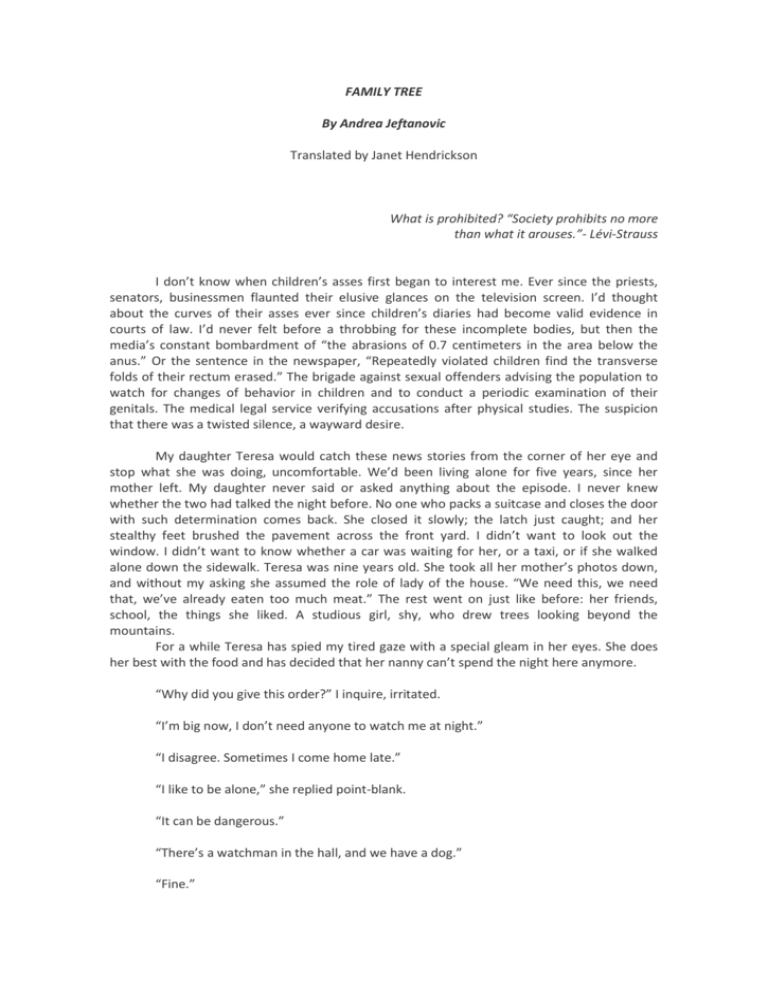
FAMILY TREE By Andrea Jeftanovic Translated by Janet Hendrickson What is prohibited? “Society prohibits no more than what it arouses.”- Lévi-Strauss I don’t know when children’s asses first began to interest me. Ever since the priests, senators, businessmen flaunted their elusive glances on the television screen. I’d thought about the curves of their asses ever since children’s diaries had become valid evidence in courts of law. I’d never felt before a throbbing for these incomplete bodies, but then the media’s constant bombardment of “the abrasions of 0.7 centimeters in the area below the anus.” Or the sentence in the newspaper, “Repeatedly violated children find the transverse folds of their rectum erased.” The brigade against sexual offenders advising the population to watch for changes of behavior in children and to conduct a periodic examination of their genitals. The medical legal service verifying accusations after physical studies. The suspicion that there was a twisted silence, a wayward desire. My daughter Teresa would catch these news stories from the corner of her eye and stop what she was doing, uncomfortable. We’d been living alone for five years, since her mother left. My daughter never said or asked anything about the episode. I never knew whether the two had talked the night before. No one who packs a suitcase and closes the door with such determination comes back. She closed it slowly; the latch just caught; and her stealthy feet brushed the pavement across the front yard. I didn’t want to look out the window. I didn’t want to know whether a car was waiting for her, or a taxi, or if she walked alone down the sidewalk. Teresa was nine years old. She took all her mother’s photos down, and without my asking she assumed the role of lady of the house. “We need this, we need that, we’ve already eaten too much meat.” The rest went on just like before: her friends, school, the things she liked. A studious girl, shy, who drew trees looking beyond the mountains. For a while Teresa has spied my tired gaze with a special gleam in her eyes. She does her best with the food and has decided that her nanny can’t spend the night here anymore. “Why did you give this order?” I inquire, irritated. “I’m big now, I don’t need anyone to watch me at night.” “I disagree. Sometimes I come home late.” “I like to be alone,” she replied point-blank. “It can be dangerous.” “There’s a watchman in the hall, and we have a dog.” “Fine.” Things continued to go strangely. Now when I invited a woman over for coffee, Teresa busied herself prowling around the house and making strange noises through the walls. Just when I began to feel the desire to meet other women. Once I timidly kissed a woman from work on the sofa. She was a sweet young woman. When I lifted my lips from hers, I saw my daughter’s eye through a slot in the wall. It was the eye of a Cyclops, ruling over the scene with hate. I contained my scream and invented an excuse to take my guest back to her house. Teresa dressed differently; she wore heavy makeup. If she came home in her school uniform and I was there, she ran down the hall to change clothes. She reappeared in the living room dressed up. Her childish figure looked somehow grotesque in this adult mask. She rubbed up against me; she sat on my knees when I read the newspaper and placed her hips between mine. I didn’t know how to handle the situation. She was a girl; she was my daughter. “What do you want?” I said to her one day, bothered. “Nothing, to look pretty, to look pretty for you.” “I don’t like it when you wear so much makeup.” “Whatever you say.” She walked indifferently to her bedroom. That night I came home late, I was trying to revive the romance with my coworker, and we went out for a drink. It had been a beautiful night. I sat on the bed, a little nauseous, and there was Teresa, in a thin nightshirt, her hair combed, her face clean and perfumed. “I missed you.” “I missed you, too. But it’s late. Go to your room,” I said, with my head between my hands. “I can’t sleep.” “Yes, you can. Go read a book.” “I can’t.” “What do you want?” “To sleep with you.” “Daughters don’t sleep with their fathers. You have your own room and your own bed.” “I don’t want to be alone.” “Fine. Stay just this once.” I moved over to the edge of the bed, careful not to touch her. I turned my back to her and fell asleep. When I woke, I turned over, and there were her open eyes, fatigued, fixed on me. I got the impression that she hadn’t closed her eyes all night. I shaved, mulling a few things over. She observed me from the doorway, still in her night shirt, playing with a lock of hair. “What’s going on?” “Nothing, I like watching you shave.” “It’s very boring.” “No, it’s not. I like to watch how you stretch your neck, turn your face, and run the razor over your skin.” “You’re going to school today, right?” I asked. “No, the break started. I don’t have class until March.” “And what are you thinking of doing with all this time? Do you want to take a class, maybe? Tell me, and I’ll take you. We can go to the coast for a few weeks in February.” It was absurd, but I felt cornered, harassed by my own daughter. I imagined her like an animal in heat that couldn’t distinguish its prey. She crawled along the walls with her hair on end, her muzzle wet, her ears fallen. How could I tell her to go look for a boy instead, a boyfriend. She lifted her skirt and bent over to throw out the trash, showing off her little underwear. Now she wore bras, and she adjusted them in front of me. She was a female animal, scattering her hormones around the house. Marking her territory and fencing me inside it. I don’t know whether this was good or bad, but Teresa didn’t look anything like my ex-wife. Instead, she was a feminine version of my angular face. The next day she waited for me to come home, dressed in her mother’s clothes. The image disturbed me so much, I now realize with shame, that I slapped her. She stood there, astonished, with her cheek bruised and her eyes open wide. I went out for fresh air, and I returned after she’d fallen asleep on the bed after an evident crying spell. The summer went by stiflingly as she embarked on a mysterious investigation. She surfed the internet for hours, printing documents, clicking from one site to another. The news channels showed the courts dismissing the cases of the senator, the businessman, the priest. All asking to go free on bail, letting the summer inertia protect their cases. All appealing to their innocence. The politician who defended children, the priest consecrated to the care of the little ones, and the charitable businessman who had done so much for at-risk children. So how to explain the children with disfigured genitals. One night we were watching an interview with one of the pedophiles. On being asked whether he’d had sex with a list of minors given by their ages and initials, the accused said indifferently, “Yes, with every one you’ve mentioned.” And he added: “I was someone who was tremendously alone at that time, and in a certain sense, I paid for the the service of having a companion.” Teresa muttered a sentence between clenched teeth that I’ll never forget: “Let’s get out of here, before these guys arrive.” It wasn’t easy to get away. I kept working in place of those who’d left on vacation, and I wasn’t able to make any extra money. When my turn came, a coworker showed his support by lending me a cabin on a certain beach that didn’t get many visitors. Despite my insistence, I couldn’t get Teresa to invite a friend. We arrived at a modest little house in the middle of a pine forest. Inside, there was a chair in the corner, a bed dividing the room in two, a wooden wardrobe with the doors half open, and a big mirror hanging from the wall. The first day, Teresa arranged everything as she liked, flooding the drawers with poorly-folded turtlenecks and winter clothes. She had come to stay. As she did this, I walked around the bedroom, looking for an exit, but it was too late. Once, Teresa handed me a drawing: a green tree with a wide brown trunk and thick brown bark. I thought this was one of the last vestiges of her childhood. But when I put on my glasses and examined the details, I understood what she was plotting. It was a lush tree, with a single trunk from which emanated many branches, from which more branches came in turn. There was a square on each branch with a man’s name inside and a circle with a woman’s name. The geometric figures multiplied exponentially across the four sketched generations. “What does this mean?” “It’s our clan. We’re at the base.” I saw her name and mine on the drawing. Then I listened, astonished. Teresa gave me a sermon, citing the Bible, affirming that in the beginning was incest. Humanity begins with a founding couple that procreates. To allow a society to emerge, one must break a prohibition. At a certain point, filial love should turn into sexual love. The father or the mother, depending on whether it’s a son or a daughter, should sleep with their offspring to breed a new son or daughter. This is a necessary act for a new society to be born. “A new society,” I whispered, incredulous. “Yes. A new species, coming from us. You will be the father and grandfather of our child. It’s the curse of origin, but it’s for a better future. “And afterward?” I asked, half-confused and half-absorbed in the drawing. “Another child, until we come up with the daughter or son that we need to multiply this new network of people. You have to break the triangle and form a quartet that keeps fracturing in new geometric figures. Two original siblings will give way to new children who will multiply without distinguishing between aunts and uncles, cousins, brothers and sisters, nieces and nephews.” “Be quiet, you’re only fifteen.” “But I’ve read too much,” she replied with aplomb. The argumentative sequence that linked her ideas gave me goose bumps. She had studied all of the factors. The consistency of her plan left me mute as I traced the white line of her scalp. “They’ll all be born sick, deformed, retarded. Is this the new society you want to create?” I managed to say, somewhat stunned. Furious, she looked into my eyes and asserted: “Inbreeding isn’t necessarily harmful. That’s a myth. Sharing a genetic inheritance sometimes strengthens positive characteristics.” She took the drawing and said more, paying no heed to my ignorant judgment. “Every time we have a child, we’ll add a branch to the tree, and the tree will grow bigger and bigger.” The night came when I could avoid her seduction no longer. We collapsed on he mattress, feeling the warmth of the sheets. I opened myself to receive the flame of the one who has wanted you for a long time. I connected with the memory of a lost appetite. On top of her, looking into those gray eyes, which were my gray eyes. I was kissing myself. I was caressing my own distinct bones, I ran against my own aquiline nose, tracing my narrow forehead. From the distance, the sound of the rattling gate. With every caress, I envied her youth and tenderness. Her palms, softer than mine, her terse muscles, a smell of violets that emanated from the nape of her neck. I was afraid and I wasn’t: I was more afraid than I believed I was. She said, “Come closer, closer.” We stumbled over the furniture. My skin against hers, the blow softened by the same essence. Suddenly I saw the amorphous mass of our bodies in the mirror on the wall. I saw myself with the sockets of my eyes empty. I threw a shoe to destroy the image, but not our embrace. Shards of glass fragmented in a thousand parts. Irregular pieces, ground glass spread on the floor of urgent caresses. No more witnesses. The secret to be written in quicksilver. When I lay down with Teresa, she was no longer my daughter, she was another person. I wasn’t her father, I was a man who desired that young and docile body. A man doomed to the task of making her ambiguous body mature. A sculptor dedicated to chiseling her imperfect figure, her half-formed members, her crude extremities. I did my best to narrow her waist, to darken her pubis, to stylize the curve of her neck, to draw the contour of her calves. I wanted to take all the woman from the adolescent in the making. No, she wasn’t my daughter, she was the plastic mission of molding her pointed breasts, of doting on the sensuality of her narrow hips, her ungainly movements. To leave behind all the horror of childhood and inaugurate sophisticated movements and thoughts. I ignore what she thought, perhaps to tighten the creases around my eyes, to revitalize my tired skin, to reduce my bulging abdomen. Periodically, I was conscious of my daughter locked in this cabin, surrounded by wood walls. I tried to decipher the message of her lips. She wasn’t a girl to wait for her knight in shining armor. She brought her forehead, covered with sweat, close to mine; her nostrils trembled. She mounted me, she forced my legs while she didn’t stop saying, “More sap for the new shoots, more.” Her thirsty tongue called up names: Sebastians, Carolinas, Ximenas, Claudios, a family tree with last names that annulled each other because they were all Espinoza Espinoza. I, born a thousand times in my children, in my grandchildren, nieces, nephews, cousins. Her young uterus would send out a fetus every nine months. Days simmering in the wait for more children. And for that time, the man, three times your age, twice your body, blood of your blood; it didn’t matter to him anymore that he gazed upon you at length, paused at your mouth and descended to your sex. He yearned for the peak, when we would lay together with our languid heads too close, with the sensation that we had each other, each other. We don’t return to Santiago; we pitch our world here. One day, I observed Teresa and saw that the cause of her weight gain, the curve of her belly was logical. We wait for the baby in peace, walking between the cypresses and pines, lifting our heads toward their crowns. She sunbathed on an improvised terrace while the diameter of her figure increased; her breasts grew; and the first stretch marks wounded her fresh skin. I went into town once a week to look for provisions. Sometimes I bought the newspaper and caught up on the cases of the politicians, the senators, the priests. I breathed a sigh of relief to be away from all that. But I don’t deny it. “Where’s the city?” This is the question I’m afraid my daughter will pronounce like a puff of air. Yes, a rumor of syllables. “Papa, where’s the city?” and the horizon will be a curtain that splits in two. The clarity of what the sun shines on. For now, I think of the foliage, of this life under the trees, counting their perennial leaves, caressing their ancient roots, cutting wood for the winter. Forboding the time when the braches that reinforce this trunk will allow it to split in two.
